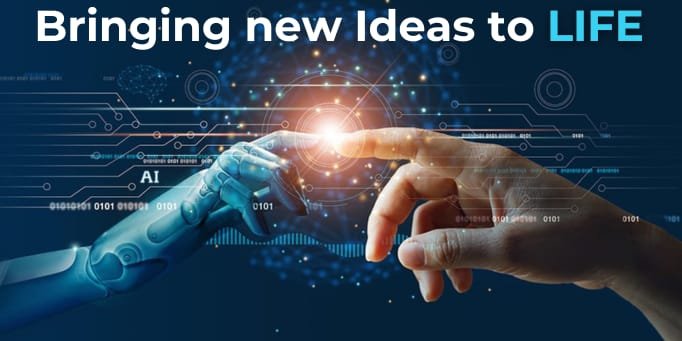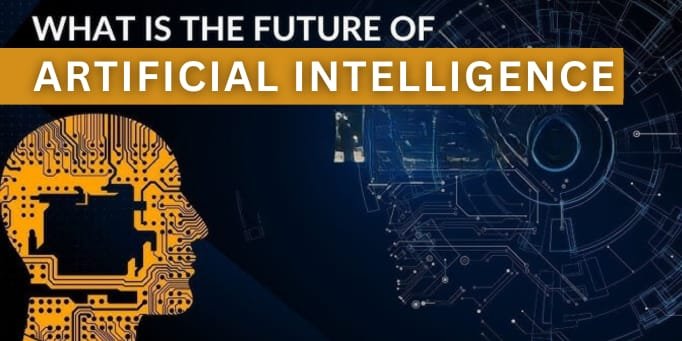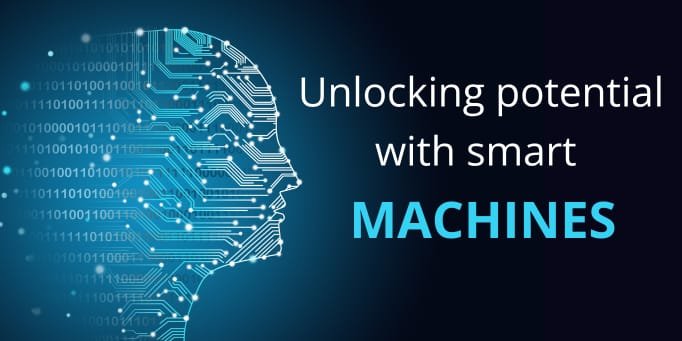Hello everyone!
Artificial intelligence (AI), which was once only the premise of movies and show has become a reality and a revolution in the realm of technology in the later years.
Artificial intelligence refers to the capacity of the machines to imitate people’s behavior and it has been developing and expanding even beyond the recent years to effect different domains of people’s lives including the health, the finance, as well as the entertainment and cleaning sectors.
Turning to the perspective of the future one can point out that AI draws a vision on the future of the development which has not yet fully developed in people’s mind. As this blog post will show, its predicted that artificial intelligence will change the face of technology as we know it as well as its implications and possibilities within the next few years.
What is Artificial Intelligence?

AI can be defined as, the capacity of a computer program to simulate and understand human like intelligence. Such tasks include, learning, reasoning, problem solving,perception and language understanding. Based on the definition of artificial intelligence, AI systems hence include components that help analyze data, make decisions without needing ‘human input’.
AI can be categorized into two main types:AI can be categorized into two main types:
Narrow AI
This one of the AI is specialized in one discipline or area of of specialty. It is designed to solve some particular problems, for example, intelligent personal assistants as Siri or Alexa, or the recommendations of movies or TV shows on some streaming platforms, or intelligent picture recognition systems.
General AI
They also refer to as AGI (Artificial General Intelligence) in this kind of artificial intelligence seeks to achieve all mental activities that are human like. Even today AGI is still a marvel of theory and as of this writing has not been attained.
Next is the ‘The Growing Influence of AI’ examines the nature and growth of AI both as a technology and as a crucial segment for most industries.
Signs of How AI is Changing Industries
There are already signs of how AI is changing industries and these are expected to increase significantly in the future. Here are some key areas where AI is making a significant difference:
1. Healthcare
The application of AI in the health sector is changing how diagnostics are made, how individual patients are treated and even administrative work. In diagnosis situations like cancer, machine learning algorithms will be able to diagnose the diseases faster than a human radiologist interpretation of the images. AI tools are also being utilized on the formulation of diets and treatment regimens that shall be suited to a given individual’s genetics as well as his medical history.
In addition, there are advances made in the use of artificial intelligence technology to predict potentially committing complications in patients with chronic disease and advising appropriate measures that could be taken. In drug discovery, AI optimize time taken since it is able to find prospective drug candidates and even estimate their efficacy.
2. Finance
In particular, in the financial field, AI is used as a tool to increase productivity and reduce risks. Concerning fraud detection, AI algorithms are employed since they help in categorizing the transactions with the help of analyzing patterns and detecting any anomaly. Trade Automation employs the use of AI in making decisions of trading more often in the markets with the help of trading algorithms.
Further, AI-powered chatbots and virtual assistants help in delivering customized financial advice while handling customers’ questions and performing banking procedures. Automated investment managers are popular apps also known as robo-advisors that are making professional financial services accessible for everyone.
3. Transportation
AEs such as self-driving cars and autonomous vehicles are considered to be one of the most popular uses of AI. Tesla and Waymo and others are also working on cars which can drive and take decisions on the road on their own. Self-driving cars’ basic functions include interpreting road scenery, identifying hurdles, and navigating in line with traffic laws by utilising sensors, cameras, and machine learning.
AI is also improving on the sectors of logistics and supply chain. Predictive analytics assist the companies in ensuring proper delivery network, stock management, and least operations expense. AI enabled systems for & VH have ability to assess the future changes & modify the supply chain as well.
4. Entertainment
With the help of AI the entertainment industry is moving up to a new level of consumers’ satisfaction level. Artificial intelligence is utilized by such platforms as Netflix and Spotify to suggest content and programs according to the users’ choices. AI-created music and creating art are also catching onto the hype now, as algorithms compose music and create art that is beyond the imagination of human beings.
It is also used in video game development to create better and Interactive play characters and even the environment. Procedural generation using AI helps a lot in the creation of large and variedgame spaces, where every stone, every bush, or every tree does not need the designer’s discretion.
The Benefits of AI
AI, therefore, has so much potential and can assumedly bring numerous positive impacts to the whole world. Some of the most notable advantages include:
- Increased Efficiency: The use of AI in project management enables automation of processes which would require a lot of time to complete. This results to higher yields and releases the robots to perform tasks that can only be effectively done by human beings.
- Enhanced Accuracy: Due to capability to aggregate, sift through, and make use of big data, AI systems alway end up with more accurate estimation and decision making than humans. This is much useful in those areas such as medical field or any financial sector where accuracy is very important.
- Personalization: AI makes it possible to offer unique solutions in two and three arenas for example in healthcare, in entertainment and in customer relations. Making use of the analysis of customer’s tendency and articulated reactions, ML can provide individualized recommendation and decisions.
- Innovation: AI is instrumental in introducing new ideas into a workplace since it brings forth new devices that may likely solve new problems and progress on new ideas. From robotics to art, the use of AI is fast developing into new frontiers of what could be done.
The Challenges and Concerns
Despite its many benefits, AI also presents several challenges and concerns:
- Ethical Issues: Some of the moral concerns that are identifiable with the use of AI include; Privacy and surveillance and Decision making. For instance, with regard to personal data, the use by the AI systems can result into issues such as data protection and authorization. Also, people argue that AI can be utilized for wrong aims, for example, deepfakes, or bot attacks.
- Bias and Fairness: Various studies have revealed that every AI system reflects & amplifies the prejudices if it is taught with bias data. This can result to a biased solution in cases whereby an employer is choosing between a white and a black employee or the police arresting a black man instead of a white man or a bank rejecting a black applicant instead of a white applicant. The problem of fairly representing groups as well as the issue of possible manipulation with users are some of the most important problems related to AI systems.
- Job Displacement: The use of AI can be expected to lead to the streamlining and hence the possible elimination of some jobs that involve repetitive tasks. New job opportunities are being develop and offered by AI and thus there is a need for employment transition management.
- Dependence on Technology: A major concern as AI systems continue to be a part of people’s lives is the overdependence on the technology. This dependency could pose risks especially where the AI systems are either unavailable or have been hacked.
The Future of AI

The future of AI has great potential ahead; however, there are going to be more significant problems to solve. Here are some trends and developments to watch for:
Advancements in AGI
Scientists are gradually placing efforts towards attaining AGI that will allow machines to solve any cognitive challenge that a human can. Overall, now AGI is not imaginable but constant efforts in research and development may get humanity closer to this target.
AI and Human Collaboration
It is expected that the future trend of AI will depend on human and computer collaboration more often. In contrast with automation displacing people AI may complement human efforts making them more efficient and effective across industries.
Ethical AI Development
There are strong expectations that due to increasing presence of AI strong emphasis should be laid on ethical standards and laws governing the usage of AI. As the use of AI increases, approaches to fight such challenges as bias, transparency, or accountability will play a vital role in AI’s future.
AI in Education
AI can take a major role in education by availing customized learning, performing routine operations, and assistance the teachers to find the needs of the learners. ITs and ALP are not the only type of applications that use AI in the educational process, quite the opposite.
Conclusion
Indeed, Artificial Intelligence is a way to the future of technology since it is likely to transform virtually all sectors of human existence. It is made evident, therefore, that across the spectrum of healthcare and finance, entertainment and transport to mention but a few, Artificial Intelligence is experiencing positive changes and value addition. However, the path over further years will be fraught with some concerns that relate to ethics, bias, job losses, and reliance on the technological aspect.
In this case, it will be necessary to concern ourselves with further development of artificial intelligence, making sure that we do not overemphasize all of its possible negative aspects. Thus, the collaboration approach, fair distribution, and focusing on ethical issues will help to leverage AI as much as possible and design the future for all the inhabitants of the Earth.
AI is not just a trendy technology that is popular right now, instead, it is the change that will define the future of technology and the world. It is therefore important that as the world embarks on the advancement of the use of AI technology, we need to be very careful in assessing the impacts so as to enable the advancement of this noble technology in a way that will benefit our society.
FAQ
- What is the meaning of the term Artificial Intelligence (AI)?
AI can be defined as the ability of a machine to mimic and/or replicate some of the human intelligence. Some of these tasks include experience, reasoning, problem solving, perception as well as language comprehension.
AI refers to the process where data is analyzed by the system so that patterns can be recognized and decisions can be made automatically with slight human interaction.
- What are the two types of AI.
The two main types of AI are:
- Narrow AI: Focused on accomplizing specific operations, including voice assistant devices and recommending algorithms.
- General AI (AGI): Is designed to be able to do any task which requires intelligence for a human being to accomplish. It is still at a theoretical level and AGI is still yet to be realized.
- What are AI applications in healthcare?
In this way, AI contributes to the development of healthcare since diagnostics are more precise, and treatment is more individualised, and administrative work is more efficient. AI applications include diagnosing radiological images, identifying risks for early onset diseases and creating optimized client care programs. They also assist in the management of chronic diseases and also in the speed up of drug development.
- How AI is used in finance?
Several areas of application within the finance industry include; fraud detection, automated trading, as well as providing financial advisory based on customer data. It predicts fraud, high-speed trading strategies, and individualized investment suggestions using robo-advisors based on the assessment of the transactions’ patterns.
- What is transport AI:
Transportation: AI continues to support new technologies like self-driving cars and autonomous transport means. It incorporates the use of sensor systems and machine intelligence in order to pilot and make driving choices. It also helps in the effective management of production through logistics and supply chain since it is able to forecast demand.





